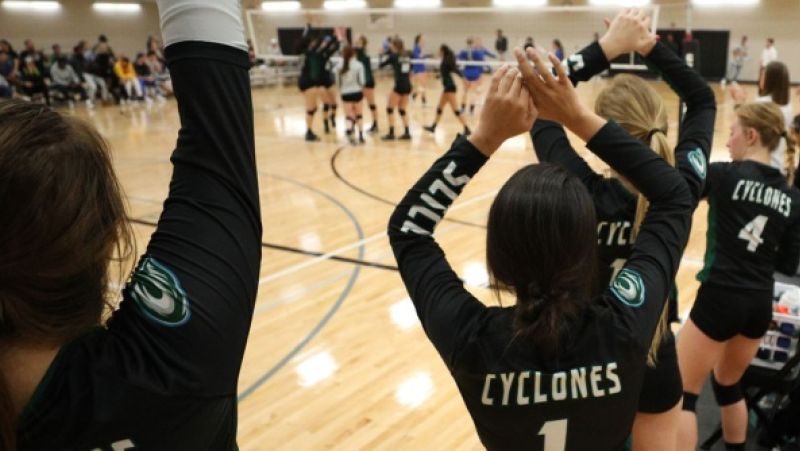
by Heidi Smith, Cyclones Volleyball Coach

The world we live in today teaches us do to whatever is needed to get to the top and be successful; those who live by this belief may achieve success but are rarely happy. Numerous studies have demonstrated that the happiest people around the world have healthy, positive, and supportive relationships in all areas of their life. We must teach our athletes that being the best person we can be should supersede the importance of winning, otherwise we are setting them up for failure.
We know part of our job as a coach is to teach our athletes life skills such as time management, communication, and conflict resolution, but we tend to ignore our star player when she rolls her eyes and has a negative attitude on the court. Many coaches say they don’t allow bad attitudes on the court but often don’t follow through, afraid of losing and wanting their best players on the court to increase the chance of another win. We MUST be consistent and hold everyone accountable, whether it’s our star player, bench player, coaching staff, or ourselves—no matter the score or opponent. If winning is the exclusive priority, this principle will not apply.
Most negative attitudes on the court stem from players wanting to show everyone in the gym that they are not happy with their performance and that they have a higher standard for themselves than their current level of play, which itself holds some merit. However, that does not justify 5+ other teammates being negatively impacted and having to use their energy and focus to lift up that teammate. Athletes can hold themselves to a high standard, play poorly, and still be a great teammate/person. It is not easy but that is what effective people do, on the court and in life.
We can share articles and books with our athletes that demonstrate the characteristics of a great teammate, but it can be difficult to incorporate those into practice. I have established a set of guidelines that we use in practice and competitions, to develop the skills and behaviors to become a great teammate.
- Every athlete’s #1 job is to be a great teammate.
- Regardless of role, playing time, position, year, etc., everyone’s primary responsibility is to be a great teammate.
- Celebrate the successes of the team, even if you are having a bad game.
- Celebrate with extended high fives. High fives at shoulder height with elbows at the side are halfhearted and not acceptable.
- We all know that volleyball is a game of energy and momentum. When our athletes choose not to celebrate, they are not cultivating the momentum to help us be successful. If they don’t celebrate, they come off the court.
- I have had several athletes tell me, “I am just a quiet/reserved person, and I don’t really like to celebrate or talk on the court.” My response is that celebrating and talking on the court are skills, just like passing and setting, so you need to work on getting out of your comfort zone and improve those skills, too, if you want to be on the court.
- When the team comes to the middle they must ALL make eye contact with each other-- no hanging heads, especially after an error. If they don’t come together correctly in practice, I make them redo it.
- If you made the error you are the first one hustling to the circle with a comment about the future not about the past error (no “I’m sorry”, “My bad”, “I suck”).
- Comments to each other on the court should not include “Don’t”, “No”, or “Never”. Replace “Don’t miss your serve” with “You got this” or “Take your time”.
- Thank and celebrate with your teammates for their assistance in getting that kill (“Great set”, “Fabulous pass”, “You called that shot so I hit line”, “Middle held the block”, etc.)
- Women/girls need to learn how to lift each other up in this society that teaches us that we are all in constant competition with each other (Courtney Ferrell has a Ted Talk titled “Girl Up” which we watch it every season).
- Fake it until you make it.
- I don’t expect you to be happy after you crush your serve into the net; however, if you behave in a way that is negative and your teammates need to put energy into you to lift you up, you are being selfish and not a good teammate.
- If your teammates are trying to lift you up but you are refusing to leave your negative place, a substitution needs to occur.
- Negative body language doesn’t belong on the court or the sideline. Amy Cuddy has a great Ted Talk, “Your Body Language May Shape Who You Are,” that we watch every preseason. Being able to control the way you respond to situations that are not ideal is another life skill that we can help them develop.
- The phrase “I can’t” is not allowed. If anyone states “I can’t,” she must leave the gym, take a mental break, and get water for as long as she needs until she can come back to the court ready to be a great teammate who is ready to try again.
- Be kind and respectful to officials, opponents, and fans—always. The coach should lead by example.
- Coaching is one of the only professions where it is acceptable to go ballistic when a poor call has been made. Then we wonder why our athletes have negative attitudes. We need to demonstrate to our athletes that we can get over a bad call with dignity, another life skill.
It comes down to being the type of teammate who we all love playing alongside. These teammates create great energy, confidence and smiles with those around them, which takes constant self-awareness and dedicated practice. Be sure to give sincere and frequent praise to those athletes who are amazing teammates. During preseason, we perform several physically and mentally challenging drills to observe which athletes are going to show frustration and which struggle to be a good teammates under pressure. Then we work with those athletes to make them aware of what they are doing and give them guidance and support to improve those skills.
What do you do if you have an athlete who doesn’t follow these guidelines? You put them on the bench. I usually give athletes a warning and ask them, “Are you being a good teammate right now?” If they are not making an effort to improve, they are subbed out within a few points. Putting an athlete on the bench is holding her accountable and is the loudest statement you can make to your team that this behavior is not acceptable. Most often, if you hold everyone accountable at the start of the season, you won’t have to deal with it at the end of the season when the win is necessary.
My All-American was having her first bad game three weeks into the season. She had terrible body language, kept rolling her eyes at herself, and didn’t make eye contact with her teammates in the circle. I gave her a warning, telling her she needed to make a change, but two points later she was subbed out of the set. Before the start of the second set I asked her if she was ready to be a good teammate and she gave me a wide-eyed “Yes” with a fake smile (fake it till you make it is part of our recovery). The All-American started the second set but things quickly went downhill. I warned her again that we needed to see a change, but within a few points she was subbed out again due to poor attitude and body language. I didn’t give her an opportunity to play the third set, and we were victorious against the average conference opponent. I never saw attitude and negative body language again from this All-American. My team knows they are much more likely to get subbed out for negative behavior than poor performance. Coincidently, if they improve their attitude and body language, their performance improves as well.
If you do make a substitution because of player’s negative attitude, be sure to explain the reason to your player. Over the years I have learned that what is obvious to me is not always obvious to the player. If I make a substitution and don’t talk to the player, she imagines all sorts of reasons why I took her out of the match, and usually the actual reason is not one of them. Excess communication is better than not enough.
What if the destructive attitude is coming from a bench player? This becomes more difficult since the coach doesn’t have the consequence of playing time. I like to show these athletes videos or picture taken during a match of the sideline/bench and show them their negative body language. We talk about the changes I need to see, and if those changes are not being made within a specific timeline, they may be dismissed from the team. Give athletes direction and a chance to grow, but ultimately, it is the athlete’s choice.
I have heard some coaches compare athletic competition to a warzone and that athletes should have their game faces on, be ruthless, “get pissed off,” and stare down the competition. As a former member of the Minnesota Army National Guard who served a deployment to Iraq, I can assure you, these athletic competitions are NOT a warzone or battlefield. As a coach, if you encourage your athletes to stare down the competition through the net, make negative comments, or cheat in any way, you are doing a disservice to your players. We are life skill teachers/coaches; these are not life skills.
Embracing this philosophy has attracted positive people to my program and significantly reduced stress and sleepless nights. When recruiting, I make sure the athlete knows that her #1 job is to be a great teammate, regardless of her role or playing time. Some recruits are turned off by this because, sadly, having attitude is part of their identity, which is a learned behavior their previous coaches and/or parents have either allowed or encouraged. Athletes with a negative attitude usually play down a level in college because most coaches aren’t willing to put up with a bad attitude unless that athlete will significantly help their program win.
I recently had the opportunity to be on a coaches’ panel that included a volleyball coach at every college level where parents and athletes could ask questions. One question was, “What do you look for when recruiting a player?” Every single coach mentioned they avoid athletes with a negative attitude. A Division 1 coach stated that they have taken prospective athletes off their recruiting list because they were poor teammates, disrespectful to their parents, or yelled at officials. We should all be teaching our athletes to be great teammates so they can be successful at whatever they choose to do.
It comes down to coaches holding our athletes accountable, and our actions speak louder than our words. We can say we won’t tolerate a negative attitude, but if we do not follow through—especially when it is our star player, when the ‘W’ is within reach—it is a disservice to our athletes and our responsibility of teaching life skills. Great teammates become great people who care about others and strengthen our program and communities.